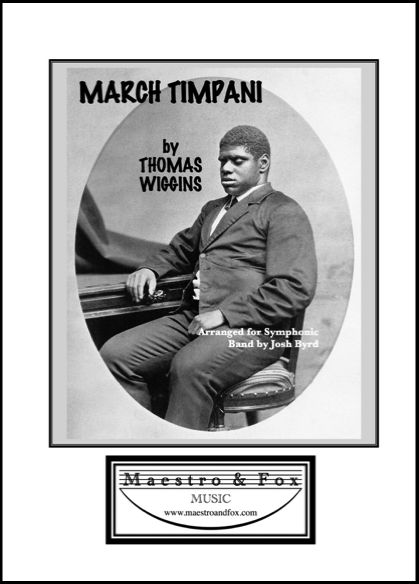MARCH TIMPANI
THOMAS WIGGINS
arranged for Symphonic Band by Josh Byrd
March Timpani was composed in 1880 for piano and appears for the first time in the current edition for symphonic band by Josh Byrd. Composed for the enjoyment of Nineteenth Century audiences, the work offers no dearth of material, presented here in slightly truncated form to obviate the barrage of repetitions offered music lovers in an age when silence abounded. Woven into the current edition are quotations of additional Wiggins tunes; namely, "Virginia Polka" and "Oliver Galop." This historic edition remembers the legacy of a performer much celebrated during his time but long forgotten to posterity.
Thomas "Blind Tom" Wiggins (May 25, 1849 - June 14, 1908) was born Thomas Greene in Harris County, Georgia. His remarkable career as a pianist was heightened by his unusual status as a blind autistic savant. While held in bondage as a slave at the plantation of Gen. James Bethune, Wiggins was unable to perform expected duties owing to his handicaps. By the age of five, however, his ability to play the piano by ear and to compose music was noticed by Gen. Bethune, who provided him access to a piano. By the age of eight Wiggins was offered to promoter Perry Oliver as a novelty act. Wiggins toured extensively, earning Bethune up to $100,000 yearly, an enormous sum for the time. The savant was known as well for his extraordinary tonal memory and frequently exhibited his ability to replicate musical performances after only one hearing. He is purported to have learned more than 7,000 works, from hymns and popular songs to waltzes and classical compositions. In 1860 Wiggins concertized at the White House at the invitiation of President James Buchanan, the first African-American to render a command performance there. Mark Twain wrote accounts of many Wiggins performances he witnessed over many decades. In 1866, after his liberation from slavery by the Thirteenth Amendment, Gen. Bethune accompanied Wiggins on a concert tour of Europe, where his performances earned him international renown. His final years were spent in the New York City area where he performed on the Vaudeville circuit, beginning in Brooklyn's Orpheum Theater. He died in Hoboken in 1908 after suffering several strokes and is buried in the Cemetery of the Evergreens in Brooklyn.
(Download)

